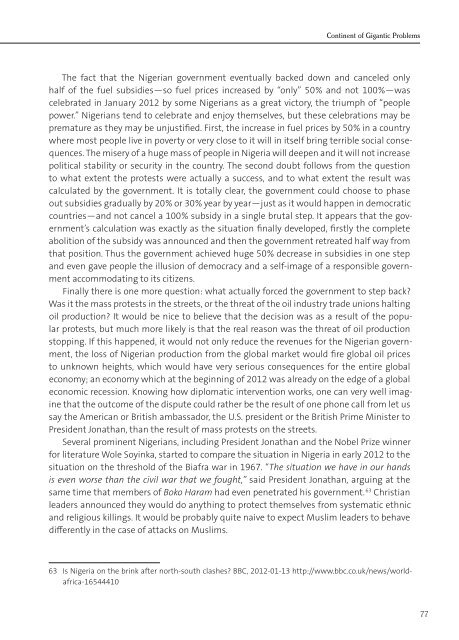Giant_and_Dwarf-FIN
Giant_and_Dwarf-FIN
Giant_and_Dwarf-FIN
Create successful ePaper yourself
Turn your PDF publications into a flip-book with our unique Google optimized e-Paper software.
Continent of Gigantic ProblemsThe fact that the Nigerian government eventually backed down <strong>and</strong> canceled onlyhalf of the fuel subsidies—so fuel prices increased by “only” 50 % <strong>and</strong> not 100 %—wascelebrated in January 2012 by some Nigerians as a great victory, the triumph of “peoplepower.” Nigerians tend to celebrate <strong>and</strong> enjoy themselves, but these celebrations may bepremature as they may be unjustified. First, the increase in fuel prices by 50 % in a countrywhere most people live in poverty or very close to it will in itself bring terrible social consequences.The misery of a huge mass of people in Nigeria will deepen <strong>and</strong> it will not increasepolitical stability or security in the country. The second doubt follows from the questionto what extent the protests were actually a success, <strong>and</strong> to what extent the result wascalculated by the government. It is totally clear, the government could choose to phaseout subsidies gradually by 20 % or 30 % year by year—just as it would happen in democraticcountries—<strong>and</strong> not cancel a 100 % subsidy in a single brutal step. It appears that the government’scalculation was exactly as the situation finally developed, firstly the completeabolition of the subsidy was announced <strong>and</strong> then the government retreated half way fromthat position. Thus the government achieved huge 50 % decrease in subsidies in one step<strong>and</strong> even gave people the illusion of democracy <strong>and</strong> a self-image of a responsible governmentaccommodating to its citizens.Finally there is one more question: what actually forced the government to step back?Was it the mass protests in the streets, or the threat of the oil industry trade unions haltingoil production? It would be nice to believe that the decision was as a result of the popularprotests, but much more likely is that the real reason was the threat of oil productionstopping. If this happened, it would not only reduce the revenues for the Nigerian government,the loss of Nigerian production from the global market would fire global oil pricesto unknown heights, which would have very serious consequences for the entire globaleconomy; an economy which at the beginning of 2012 was already on the edge of a globaleconomic recession. Knowing how diplomatic intervention works, one can very well imaginethat the outcome of the dispute could rather be the result of one phone call from let ussay the American or British ambassador, the U.S. president or the British Prime Minister toPresident Jonathan, than the result of mass protests on the streets.Several prominent Nigerians, including President Jonathan <strong>and</strong> the Nobel Prize winnerfor literature Wole Soyinka, started to compare the situation in Nigeria in early 2012 to thesituation on the threshold of the Biafra war in 1967. “The situation we have in our h<strong>and</strong>sis even worse than the civil war that we fought,” said President Jonathan, arguing at thesame time that members of Boko Haram had even penetrated his government. 63 Christianleaders announced they would do anything to protect themselves from systematic ethnic<strong>and</strong> religious killings. It would be probably quite naive to expect Muslim leaders to behavedifferently in the case of attacks on Muslims.63 Is Nigeria on the brink after north-south clashes? BBC, 2012-01-13 http://www.bbc.co.uk/news/worldafrica-1654441077


